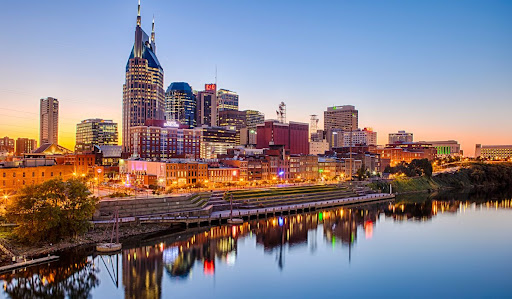Jump Ahead To:
If you’re considering a move to Atlanta or Nashville, you’re probably overwhelmed with choices. Which city has the best schools? What’s the crime like? What about the cost of living? How much does the average home cost? Maybe you’re not ready for homeownership and need to know the rental market in Atlanta and Nashville. These questions and many more should be answered before your move. Our Atlanta/Nashville comparison guide will help you decide.
Ready to move already? We have local movers in Atlanta, as well as moving services in Nashville to get you there in one piece.
Two Unique Southern Metro Regions
Separated by a three-and-a-half-hour drive to the northwest, Nashville and Atlanta are worlds apart. For example, you’re more likely to feel crowded in what locals affectionately call Hotlanta. The city’s population density inside the city limits is 1,422 people per square kilometer. Nashville’s population density is 548 per square kilometer. Atlanta’s 132 square miles versus Nashville’s 437 square miles means almost three times as many people live within Atlanta’s city limits. In 2020, Atlanta’s population was 499,127, and Nashville’s was 689,447. However, Atlanta’s lower population doesn’t include people living in the suburbs, which stretch to the AR border and encompass much of Northern GA. Roughly 6.6 million people live inside city limits and its sprawling suburbs.
Both cities have diverse populations. Atlanta’s White and Black populations are 38.5% and 46.7% respectively. Nashville’s diversity is comparable with other big cities at 53.3% White and 24.3% Black. Atlanta and Nashville also have significant Hispanic and Asian populations, bringing diverse layers into urban living.
What Makes Atlanta Special?
Atlanta’s Mile Zero monument represents its historic founding in 1837 as the last Western and Atlantic railroad stop. The railroad opened the west to homesteaders as the region became a hub for commerce and trade. Who can forget Atlanta’s role in the American Civil War? The city didn’t take long to become a major transportation and trading hub. The city had 100,000 residents by 1900 and crossed the 300,000 threshold in the 1940 U.S. Census.
Modern Atlanta has many attractions and activities that mix traditional Southern charm and cultural diversity. Centennial Park is a reminder of the ’96 Olympic Games and the prominent role Atlanta had as it hosted athletes from around the world.
Atlanta supported the revitalization of the Atlanta Underground, where some buildings date back to the 1860s. Today, it’s a thriving art, food and entertainment destination right in the heart of Downtown Atlanta.
One of the most unique aspects of Atlanta is the large tree canopy that covers almost fifty percent of the land. This is unusual for larger metropolitan regions where concrete dominates landscapes. The most visited park in Georgia is Stone Mountain with its Confederate monument. Atlanta also offers world-class hiking, like Arabia Mountain Top Trail and the Shawnee Mountain Indian Seats Trail.
Entertainment in Atlanta
As a state capitol, Atlanta has a thriving professional population that likes to have fun in the city’s famous nightclubs and restaurants. Be single and glamorous at the Tongue and Groove and the Havana Club, where you might see a celebrity or two, or go underground with the hipsters at the MJQ Concourse.
For the discerning and adventurous foodie, Atlanta’s nightlife supports twenty-seven Michelin-star restaurants. Equally impressive is the Ryman Auditorium, which hosts concerts and events, just as it has for hundreds of years.
Atlanta’s Schools
Two school districts serve Atlanta: Fulton County, with just over 94,000 students, and Atlanta Public Schools, with about 52,000 students. Like all urban settings, some neighborhoods and their schools perform better than others. The best public schools are Austin Elementary School, Kittredge Magnet School and Heards Ferry Elementary School.
The school ranked the highest in the Atlanta Metro area is Gwinnett School of Mathematics, Science, and Technology. The student-to-teacher ratio is an impressive nine to one. Gwinnett is also ranked nineteenth in the nation for test scores and college acceptance. Another top-ranked school is Fulton Science Academy.
Stable Economies and Low Jobless Rates
Atlanta and Nashville have vibrant economies. Supported by state government-supported jobs, residents in Atlanta and Nashville have numerous employment opportunities. With 71,000 employees, the State of Georgia is the highest employer in the state. Nashville’s state employee workforce numbers about 11,000, with the State of Tennessee employing the most people in the state.
Cost of Living in Atlanta vs Nashville
The cost of living in Atlanta versus Nashville is about equal, with a few notable examples. Nashville’s average monthly salary is $4,946; Atlanta’s average monthly salary is $5,394. The average home price in Atlanta is $379, 911. Compared to Nashville’s average home price of $430,946, Atlanta offers a better deal, particularly for first-time homeowners. The latest numbers show rent in Nashville is, on average, 4.2% higher than in Atlanta.
Nashville’s average cost of groceries is 2% higher than Atlanta’s. However, Nashville’s unemployment rate is consistently 2% lower than Atlanta’s. Atlanta’s poverty rate is slightly lower at 18.5% versus Nashville’s 20%.
Nashville: Country Music Capital of the World
Nashville, Tennessee is the cultural center of American country music. The state capital is also home to the Grand Ole Opry, a venue famous for introducing country music stars to the world. This region of the United States has stunning rock formations and tumbling waterfalls, like Harpeth River State Park and the Tunnel Waterfall.

Nashville’s Schools
The state of Tennessee has put considerable time and funding into improving its education system. Recent student achievements put Tennessee into the top 25 states for math and science outcomes. The result is a modern education system where teachers enjoy positive reinforcement from local school districts.
Nashville’s Davidson County School District has slightly more than 84,000 students from pre-K to twelfth grade. Top-ranked Martin Luther King Junior Magnet-Pearl High School has consistently high ratings for above-average test scores. Two of the top-rated elementary schools in Nashville are Glendale Elementary and Meigs Middle Magnet Prep.
Outdoor Living
The nation’s metropolitan regions have invested money and planning into developing outdoor pedestrian and bike paths. In Atlanta, the more popular bike/pedestrian trials are Beltline and Eastside. These trails join Mid Town Atlanta to adjoining neighborhoods. Nashville’s Music City Beltway is a twenty-six-mile bike causeway that connects Percy Priest Dam with Percy Warner Park.
What Makes Nashville Special?
From the lucrative eighteenth-century fur trade to Long Hunter Daniel Boone’s exploits, Tennessee occupies a significant place in American History. Colonial frontiersmen would be astounded at how many people live in the Nashville region, which is the most populous in the state.
Nashville’s origins remind us of how wild Tennessee used to be. Because rivers were the first highways, revolutionary era Americans understood they needed a port on the Cumberland River. That port city is Nashville, named after the legendary Continental Army General Francis Nash.
With a rich historical vibe that is everywhere, the modern trappings of a state capitol make Nashville one of the most unique destinations in the world. From the Country Music Hall of Fame to an authentic recreation of the Ancient Greek Parthenon, the Nashville metro region attracts tourists and young professionals alike.
Entertainment in Nashville
As the world’s country music capital, Nashville’s nightlife highlights live music every night. It’s not uncommon to hear different performances as you walk by the dozens of bars and clubs. Some are local gems, like House of Cards, which is located under the Johnny Cash museum. You’ll enjoy a dinner show along with classic magic acts.
For the classic nightclub experience, head to Nashville Palace for high-energy dancing. Layla’s Honkey Tonk has been around for a few years, and locals still tip the band as the hat reaches patrons.
Crime and Safety in Atlanta vs. Nashville
Atlanta and Nashville are state capitals with the usual big-city challenges. However, these classic Southern cities have undergone significant infrastructure upgrades and urban revitalization, making them ideal for young professionals.
With an overall grade of C-, Atlanta’s crime rate is comparable to other big cities. As you move out into the suburbs, the crime rate improves. The crime safety grade for Nashville is on the low end of passing. However, statistics show it’s safer to the south and northwest in Nashville’s suburbs.
Traffic and Public Transportation in Nashville vs. Atlanta
Nashville is notorious for traffic congestion, mainly because the infrastructure hasn’t kept up with the increased population over the last twenty years. Atlanta’s traffic is similar to most metropolitan regions, where commuters crowd the freeways. The better option in both cities is public transportation. A one-way fare in Atlanta is $2.50, with a monthly pass costing $95.00. Nashville’s public transit system charges $2.25 for a one-way fare, with monthly passes costing $65.00.
Final Thoughts
Call us if you’re looking for help with your move to Atlanta or moving to Nashville. We’re Bellhop, and we help people like you with a stress-free moving experience.
- Most Walkable Neighborhoods in Richmond - May 21, 2024
- Best Schools in Omaha, Nebraska: A Comprehensive Guide - May 9, 2024
- The Best Schools in Tucson, Arizona - April 5, 2024



